Relevant Overviews
- Content Strategy
- Online Strategy
- Social Media Strategy
- Content Creation & Marketing
- Online Architecture
- Digital Transformation
- Thinking tools
- Zettelkasten
- Personal Productivity
- Innovation Strategy
- Communications Tactics
- Psychology
- Social Web
- Media
- Politics
- Communications Strategy
- Science&Technology
- Business
Overview: Thinking tools
Intro: why this overview?
I first came across the interrelated concepts overviewed here after launching myhub, and realised I'd been developing similar ideas as far back as 2013, when I first piloted this Hub on Tumblr (see Why you need a Personal Content Strategy). My ideas for MyHub evolved as a result - I now see:
- the user's public hub as the part of their Second Brain which they share with the outside world using the ActivityPub open web standard for decentralised social networks (aka Fediverse - see related Overview)
- the underlying MyHub content management system evolving into a Thinking Management System, with content productivity and creativity tools integrated within it.
As far as I know this hasn't yet been done: creators are currently supposed to do their thinking in Obsidian, Roam or some other "thinking tool" software, and then publish their content using Wordpress, and then share it via Twitter. Why not make your public website - and the writing on it - a seamless extension of your second brain? And why not network it with other second brains via the Fediverse?
Why not make your public website - and the writing on it - a seamless extension of your second brain?
To turn these ideas into reality, however, I need to do a deep dive into thinking tools. I'm using my current personal content strategy - ie:
- refocusing my Priority Sources (newsletter filters, Highlights Twitter List, etc.) on sources of high-quality content about thinking tools
- queueing the best content they publish on a daily basis
- reading and annotating it on a daily basis
- reviewing that content on a weekly/fortnightly basis, and updating this Overview as required
- developing my own ideas in the form of notes, newsletters and posts.
More: Simplifying Zettelkasten by working out loud
This Overview is therefore a crucial part of this process: it provides both a summary of what I have discovered in this space so far, and (below) a search result of the content I read when developing this Overview (stuff I Like), and the content I wrote and built as a result (stuff I Think and Do). In other words:
- I'm using my personal content strategy processes to explore directions for MyHub's evolution
- I'm using my current Hub to test how well its features support those processes today, and how they evolve
- the rest of this Overview is a continual work in progress, written primarily for myself. If you want to see what I've written, then jump straight to All the Stuff I Do or Think about Thinking Tools, Anytime.
Key concepts
(Last update: 31/10/2021): When I created this overview I identified 10 pre-existing tags to use as a baseline: inbox zero, spaced repetition, 2ndbrain, fedwiki (for federated wiki), mindfulness, mindhack, (information) overload, roamresearch, weekly review and zettelkasten. That pulled in 44 resources, each with at least one of those tags.
(Feature idea: AI & visualisation tools integrated into my backoffice to help better surface concept clusters and the explore links between them).
Some notes on the major concept bundles:
- Second Brain (2ndbrain): essentially a synonym for thinking tool (which I use, as I prefer verbs over nouns)
- Productivity, GTD, Mindfulness: while a lot of the resources tagged mindfulness paint it as a racket, I still want a thinking tool that replaces FOMO with the serene confidence that my thinking tool has (a) captured the content I need to read, the stuff I have already read & the ideas I've already had; and (b) will easily surface it when I need it. It must support personal Getting Things Done (GTD) processes rather than become a GTD tool: it'll have a reading queue, for example, and hopefully provide a stream of ToDos to external task management tools.
- Zettelkasten, Knowledge Management, Creativity, Ideation: the Zettelkasten personal knowledge management (PKM) technique will be a building blocks of the MyHub thinking tool, which is why I created an entire overview on it. My zettelkasten is currently distributed across several IT tools: this Hub (public bibliographic notes and other public content - i.e., the stuff I Like, Think and Do); Pocket (my reading Queue): Asana (ToDo mgt) and fleeting/permanent notes (Roam Research). While it works as a whole, it's hard to connect the dots between these different siloes, so I'll be exploring other tools as I develop this overview.
- (Personal) Content strategy: content strategy is itself an important tag on my Hub (188 resources and counting) as it's a major element of most of my professional consulting gigs. In this context, however, the focus is on personal content strategy: what sorts of content are important to you, where do you put that content, how do you manage it, which types do you share, and how? While there's a major overlap with personal knowledge management, you need a personal content strategy first, as it defines the needs.
- Annotation, Curation: If you annotate (make notes on) what you read as you read it, you're more likely to absorb the knowledge within it and apply that knowledge to your life. If you curate it (tag it) as well, you're more likely to find it again when you need it (assuming you have a half-decent knowledge management tool), alongside your own ideas and other notes (also tagged). Most people tag these notes in their thinking tool, which is private. By integrating thinking tools into MyHub, users will be able to keep some notes private and share others as part of their personal content strategy (next).
- Progressive summarisation: successively summarising knowledge to better improve understanding and memorisation. This and other Overviews provide a simple example: after summarising each resource as I annotate it into my Hub, I summarise the knowledge of multiple resources in an Overview.
- Fediverse: a "collection of interoperable social networks built on Open Web standards... [including] Twitter-lookalike Mastodon and YouTube-lookalike PeerTube", according to my dedicated Overview. It's here as well because linking Hubs together via Fediverse standards would allow users to expand their thinking tools to include the notes publicly shared by other Hubs, Mastodon & PeerTube accounts, etc. Moreover, those accounts would also be able to follow Hubs.
Key elements
Different tools have different elements, but here are some of the most important and/or common ones.
Flexible/difficult vs. inflexible/easy (aka 80/20 rule)
The 80/20 question (aka the Pareto principle) is central to productivity, and applies to many software tools - do you design it:
- to be used in only one way: this makes it really easy to get started, but difficult/impossible to customise to your needs
- or as a toolbox: each user can customise to its specific needs, but only after a lot of work?
The flexible/difficult approach is IMHO best illustrated by roamresearch: it's enormously powerful and flexible, but to take advantage of that you need to dive deep and geek out on templates and other plug-in code developed by 3rd parties. If you don't - like me - you end up with a lot of notes, but you're not harvesting the true power of your second brain. For me it fails the 80/20 rule: too much effort to get something useful out of it.
Bidirectional links
Extremely powerful feature. In essence, it means that linking from page A to page B adds a link from B back to A, but there's a lot more to it than that. I'm currently most familiar with Bidirectional links from roamresearch, where every page is designed like a Zettelkasten overview, and there's a page for every tag.
To be continued.
Blocks vs. pages
Does the tool use pages to manage knowledge? Or is a page simply a collection of blocks, each with its own unique identity, allowing you to find and manipulate it separately from the page in which it was first created?
Again, I understand this question principally through the optic of roamresearch, which takes the latter approach. To be continued.
Tools to explore
See: resources tagged #2ndbrain and #tool. I am currently migrating from RoamResearch to Obsdian, but you can't throw a stone without finding another one being launched.
---
Automated links to recent, relevant Highlighted Resources follow.
---
Relevant resources
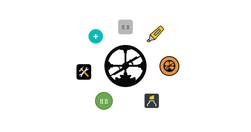
many browser extensions to improve your experience of Roam Research.
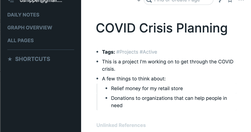
how Roam’s first prophet organizes his life... I think of Roam as a low friction database oriented around tying ideas together over time... other note-taking app... work kind of like a filing cabinet... each project I do gets its own page in Roam... at least two tags to it: #Projects... #Active ... I’m actively working on it... automatically …
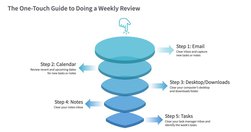
most people... [think] a Weekly Review ... a comprehensive “life review,” requiring hours ... In this guide, I’ll reframe ... to a short, quick, and easy habit that you’ll look forward to completing...productivity is just like your finances: it doesn’t work if it changes too often... should be a quick check-in to give you clarity...: Clear your …
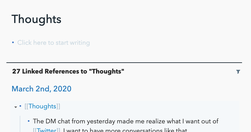
How to take smart notes explains the Zettelkasten system... explain how I apply rules 1-4 of Zettelkasten when using Roam
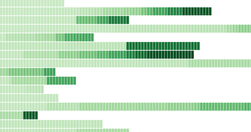
The Four Horsemen of this emerging Textopia are... Roam attempts to implement a near-full conception of hypertext as originally conceived by visionaries... looks like a cross between a slightly weird wiki and ... Evernote. It’s not... block-level addressability, transclusion ... and bidirectional linking ... utterly transform the writing experienc…
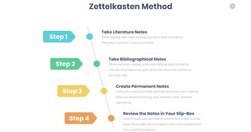
Zettelkasten allowed him to: build a huge web of knowledge, retrieve the right memory when needed, find meaningful connections among topics, and develop his ideas, arguments and discussions efficiently...The first step ... taking literature notes as you read something ... what you don't want to forget ... be brief ... in your own words ...second s…
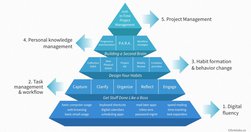
people often adopt new tools ... challenges they’re facing at work. The shiny new thing ... soon becomes just another layer of complexity... the Digital Productivity Pyramid provides a framework for any stage of a knowledge worker’s learning journey, showing them where to focus next...digital productivity is not a linear learning process. You don’…
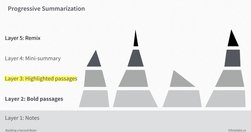
The challenge of knowledge is not acquiring it... The challenge is knowing which knowledge is worth acquiring. And then building a system to forward bits of it through time, to the future ... challenge where it is most ... needed...when you’re applying that knowledge directly to a real-world challenge, you won’t have to worry about memorizing it..…

Luhmann... published more than 70 books and over 400 scholarly articles... one of the most important sociologists of the twentieth century ... “I’m not thinking everything on my own. Much of it happens in my Zettelkasten”...adopt his method and ... learn better, think better, publish more, and be more creative... A Zettelkasten is ... a box of not…
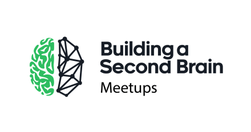
The key to Inbox Zero... “touch each email only once.”... only a well-designed underlying system can make such elegant action possible.... your annotated checklist for One-Touch Inbox Zero, in 5 EASY STEPS!...The main problem with how people use email is that they use it for everything.... Every other function is much more effectively handled by o…

for iPhone users, but all optimizations are transferable...Your phone is... trying to suck as much energy out of you as it can. Today... we’ll turn your phone into a mindfulness enhancer... designed based on how I aspire to behave... Great tools share three characteristics...:only trigger you when it actually benefits you to use them.require as li…

“If your job consists of Tweeting for someone else, you owe it to yourself to think of something else in 2018. Particularly if you’re under 35."It’s early January, and so time to add to the slew of “What you should do in 2018” posts sloshing around the Net.

Many famous scientists have something in common—they didn’t work long hours... lives were full and memorable, their work was prodigious, and yet their days are also filled with downtime... great students didn’t just practice more than the average, they practiced more deliberately... engaging with full concentration in a special activity to improv…

a fascinating inquiry into how our subjective experience of time’s passage shapes everything from our emotional memory to our sense of self....the disorienting sense that time isn’t something which happens to us — rather, we are time.... Distracted by the obligations of everyday activities, we are no longer aware of ourselves…... loss of contact …

Propaganda warfare is increasingly shaping narratives, policies and lives around the world.
We have ideas for sponsored Codas, that are of interest to specific groups.
Let’s take a break from the Donald, Facebook and the end of democracy, and try to focus on what’s important.

disconnectionists don’t seem to have a robust political plan for addressing their concerns; it’s all about small-scale individual action. “Individuals unplugging is not actually an answer to the biggest technological problems... We must subject social media to the kind of scrutiny that has been applied to the design of gambling machines in Las Veg…
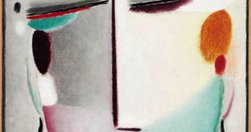
Fascism’s rising while the global economy’s stagnating... And we’re…meditating? All the great spiritual masters say: everything is meditation. ... When we separate it as an activity we perform now and then, we’re not really meditating at all.... We are using the techniques of meditation ... To escape, run away, dull the pain. Like taking spir…

the root of our human frustration and daily anxiety is our tendency to live for the future, which is an abstraction... Writing more than half a century before our age of computers, touch-screens, and the quantified self, Watts admonishes ... "The working inhabitants of a modern city are people who live inside a machine to be batted around by its w…
Coda’s mission is to “stay on the story” after mainstream media leaves a crisis region... We pick crises that are consequential and complex, and that can’t be understood through sporadic flashes of attention... the site won’t be trying to keep up with breaking news...watch things unfurl at the pace of evolving trends rather than daily development…

In our busy modern world, I’ve found one very surprising key to bringing more quiet to the mind and in turn practicing more mindfulness, and that is using a good task management system, such as the productivity methodology GTD... knowing that I have everything captured in a trusted GTD system gives my mind space to rest and focus on whatever is…
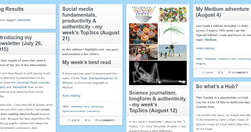
I'm launching a enewsletter to ensure I absorb something from the social media firehose.
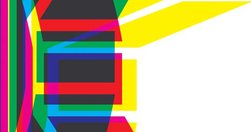
Control the digital overload rather than letting it control you. But how, exactly, does one do that? We asked two experts: Larry Rosen, a psychologist, and Alexandra Samuel, a technologist. We suspected that their disparate backgrounds would lead them to offer dramatically different advice, and we were right. - Conquering Digital Distraction - …

"If you spend a lot of your everyday moments and time in the future or the past or you have difficulty focusing and you feel this may have a negative effect on your life then maybe you want to learn to live more in the present moment. Here’s what works for me to do that. Just a few simple things that I use in my normal day." Particularly relevan…
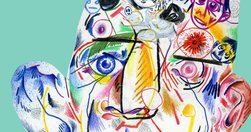
"the majority of participants reported that they found it unpleasant to be alone in a room with their thoughts for just 6 to 15 minutes.... in one experiment, 64 percent of men and 15 percent of women began self-administering electric shocks..." How our mobile-phone-driven flight away from idletime and interiority damages our psychology, physical…
Two Weekly Review posts on the subject of innovation.

Excellent article, via @joncaswell, pointing out that not only is Mindulness a treatment, not a cure, it's being peddled by those responsible for the disease... "We must subject social media to the kind of scrutiny that has been applied to the design of gambling machines... ... [it's a mistake to assume] that anxiety and insecurity are the nat…
“The top theme last week on my TumblrHub was content in its varied forms: content strategy, curation, audiovisual, storytelling, data journalism, user comments and more.” - first weekly review of this TumblrHub, posted on LinkedIn.

"fantasies dull the will to succeed: Imagining a positive outcome conveys the sense that you’re approaching your goals, which takes the edge off" - The Powerlessness of Positive Thinking : The New Yorker
Relevant Overviews
- Content Strategy
- Online Strategy
- Social Media Strategy
- Content Creation & Marketing
- Online Architecture
- Digital Transformation
- Thinking tools
- Zettelkasten
- Personal Productivity
- Innovation Strategy
- Communications Tactics
- Psychology
- Social Web
- Media
- Politics
- Communications Strategy
- Science&Technology
- Business